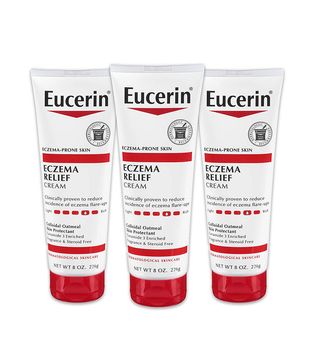I've Had Eczema My Whole Life—These Are the Foods That Are Supposed to Help
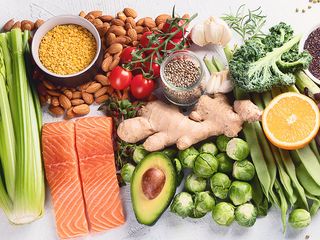
If there's one thing that's constant in my life, it's that I can always count on an eczema flare-up to make life a little bit more interesting (read: annoying). I've had eczema since I was a baby. It used to appear on the backs of my legs and on the creases of my elbows when I was little. In high school, it started showing up (in a big way!) on the palms of my hands, and it hasn't stopped since, causing me to have scaly, dry, and itchy hands almost all the time.
I've gone through many tubes of prescription topical steroid ointments and creams. I try to wear gloves when I wash the dishes (and do it about 50% of the time). I have a travel-size tube of Eucerin in all my handbags.
While I've gotten through the past 30 years of my life keeping my eczema (mostly) in check, I wanted to do more research into whether diet affects eczema flare-ups, so I tapped medical and holistic experts to see what they had to say.
First things first for the uninitiated: What exactly is eczema? According to the Mayo Clinic, it is also known as atopic dermatitis, and it is "a condition that makes your skin red and itchy. It's common in children but can occur at any age. Atopic dermatitis is long lasting (chronic) and tends to flare periodically. It may be accompanied by asthma or hay fever." People may get eczema if it runs in their family or if allergies, hay fever, or asthma are prevalent in their family.
"Generally speaking, we're not 100% sure on any single absolute cause of eczema," says Jaclyn Tolentino, DO, a board-certified physician at Parsley Health. "That said, we do know that eczema triggers are typically either environmental or immune-related, although other factors, including stress, can contribute to flare-ups. Environmental triggers can include detergents, fragrances, cosmetics, chemicals, and even certain types of fabrics or fibers. Situations in which the immune system is stimulated can cause flare-ups, like illnesses, food allergens, or sensitivities and allergic reactions."
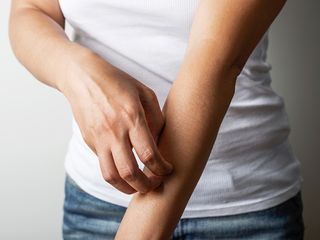
In terms of some foods causing eczema, it's a gray area and ultimately depends on the person. "While food allergies can stimulate eczema in very young children, that relationship becomes less clear in adults. Foods that cause eczema flare-ups are generally going to be specific to the sensitivities or allergies of that particular individual," Tolentino says. "Clinically, we see a lot of people who experience an improvement in their eczema by eliminating dairy or gluten, which provoke an inflammatory response in many people. Other common potential dietary triggers include sugar, shellfish, eggs, peanuts, or soy. But again, the relationship between food and eczema is more complicated than simple causation."

Tolentino says one way to determine how to manage eczema is through an elimination diet, but you'll want to proceed with caution, as she says overly restrictive diets should be avoided in children who have eczema and are not a good long-term approach for adults. If you want to go that route, consult a medical professional to ensure you're getting enough nutrients.
"Unfortunately, there isn't a large body of research regarding the specific relationship between dietary interventions and eczema as a single intervention," Tolentino says. "Which means that your best approach is going to be working with your doctor to identify and avoid food sensitivities that are unique to you, optimize your gut microbiome, address systemic inflammation, evaluate any environmental concerns, and support your immune system."
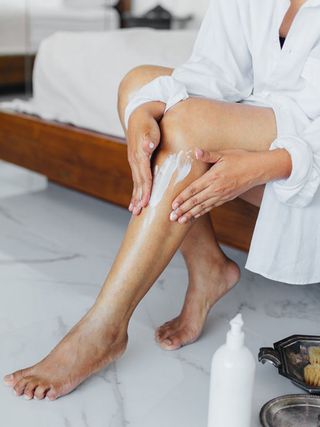
One thing that might cause flare-ups from a holistic perspective? The status of your liver, holistic health expert and medical intuitive Amy Mercree believes. "One of the top things I see is that a lot of the times when we have skin issues, it's all starting in the liver," she says. "Now with eczema, we know that there's also a genetic possibility, so there is a gene mutation that lessens the protective barrier on the skin that might be a cause. But beyond that, the liver is what is filtering all the toxins out of the body, and there are so many health issues that are caused by an overloaded liver essentially."
But how can you clear your liver? You can make a few additions and some eliminations from your diet to see if they work for you. Mercree outlined a few steps for us but warns that you'll want to do it over time and gently. As always, check with your doctor before making dietary changes.
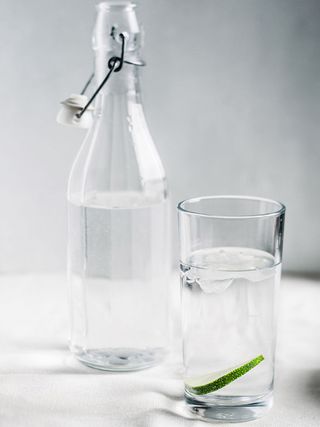
Add some lime to your water: Who doesn't love a little bit of citrus in water to make it that much more refreshing? "One of the easiest ways to support the liver is to add a squeeze of fresh lime juice to water. It's super simple, and it's a way that helps to gently flush the liver," Mercree says.
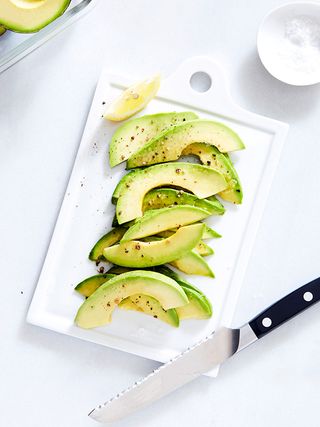
Consume those fatty acids: We already know that fatty acids could benefit your heart and brain health, so this is yet another reason to add them to your grocery list. "It's great to go with wild-caught fish; anything with essential fatty acids—avocado, flaxseed oil, pumpkin seeds, chia seeds are really good. Anything that's going to boost immunity as well because part of the problem with the eczema is if that protective layer over the skin is not as robust as we want, then there are bacteria getting in," Mercree recommends.
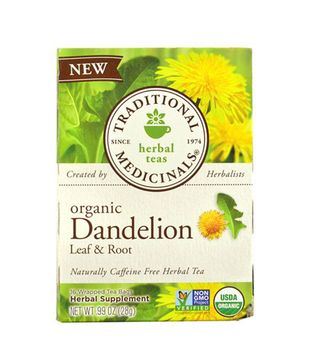
Try herbs: There are some herbs that many believe can cleanse the liver. "For eczema, you want to be gently clearing the liver on a regular basis, so that would be a cup of weak- to medium-strength brewed dandelion tea daily, for example. Or same thing with milk thistle, but not everything all at once and not like a tea where you brewed it so strong that you're going to throw your liver out of whack," Mercree suggests.
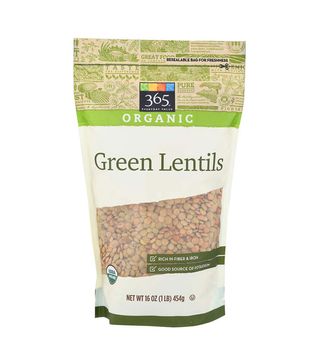
Eat high-fiber foods: Your gut health can also be contributing to a flare-up, Mercree suggests, so probiotic foods like kimchi can help. "The other essential thing is you have to eliminate on a digestive level; essentially go to the bathroom two to three times a day because anything that's sitting in the gut fermenting is causing an out-of-whack microbiome, which is then affecting your liver, and both of those things are affecting the skin. High-fiber foods will help and magnesium, too," she says.
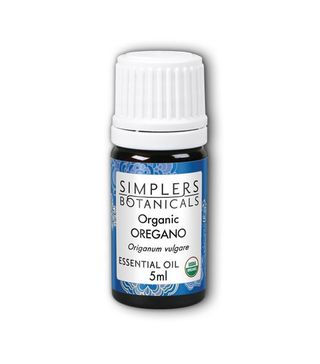
Test out essential oils: "Another thing you can do is use internal therapeutic-grade essential oils of oregano, sage, thyme, and lemon—they are all antiviral, antifungal, and antibacterial. That's a way to tamp down the bad bacteria in the gut, and then after you can replace the good bacteria in the gut," Mercree says. If you want to add them to food or drink, you have to make sure they are therapeutic-grade, and since they're pungent and taste very strong, they're better consumed in capsule form, she suggests.

Whatever way you choose to manage your eczema through diet, you should consult your doctor or a healthcare professional so you can personalize it to your specific condition since it's not a one-size-fits-all-approach and research still needs to be done on the topic.
The best way to deal with eczema is to avoid anything (food or otherwise) that makes it worse. "The best strategies for managing eczema all involve limiting exposure to triggers and irritants and keeping your skin moisturized and soothed," Tolentino says. "Dry environments and heat can be aggravating to the skin, so I recommend avoiding very hot baths and showers, and make sure to take extra care in very dry environments. Moisturizing is key—oil-based moisturizers can be especially beneficial for eczema sufferers. Stress can also potentially contribute to eczema flare-ups, so it's very important to manage stress and exhaustion. Mind-body interventions like meditation and breathwork can be very useful for combating stress and anxiety that can contribute to eczema."
Next up: These 9 Foods Will Help You De-Bloat Faster Than Anything Else
This article was originally published at an earlier date and has since been updated.
Disclaimer
This article is provided for informational purposes only and is not intended to be used in the place of advice of your physician or other medical professionals. You should always consult with your doctor or healthcare provider first with any health-related questions.
Sarah is lifestyle writer and editor with over 10 years of experience covering health and wellness, interior design, food, beauty, and tech. Born and raised in Los Angeles, she attended New York University and lived in New York for 12 years before returning to L.A. in 2019.
In addition to her work on THE/THIRTY and Who What Wear, she held editor roles at Apartment Therapy, Real Simple, House Beautiful, Elle Decor, and The Bump (sister site of The Knot).
She has a passion for health and wellness, but she especially loves writing about mental health. Her self-care routine consists of five things: a good workout, “me” time on the regular, an intriguing book/podcast/playlist to unwind after a long day, naps, and decorating her home.
-
 I Only Ate Sakara Life Meals for 30 Days—Here Are 7 Things That Happened
I Only Ate Sakara Life Meals for 30 Days—Here Are 7 Things That HappenedThe brand's 30-Day Fall Reset is finally here.
By Erin Jahns
-
 The 6 Warning Signs You're Not Getting Enough Protein
The 6 Warning Signs You're Not Getting Enough ProteinAnd what to eat to up your intake.
By Sarah Yang
-
 Everything This Professional Ballet Dancer Eats to Fuel Her For Performances
Everything This Professional Ballet Dancer Eats to Fuel Her For PerformancesHer grocery staples include high-quality French butter.
By Candice Aman
-
 These 8 Foods Are the Worst for Rosacea—Here's What to Eat Instead
These 8 Foods Are the Worst for Rosacea—Here's What to Eat InsteadControl those flare-ups.
By Sarah Yang
-
 15 Things That Cause Bloating and How to Get Rid of It ASAP
15 Things That Cause Bloating and How to Get Rid of It ASAPTry these.
By Sarah Yang
-
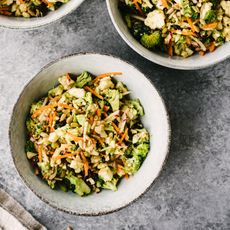 Is the Alkaline Diet Overhyped? What Experts Want You to Know
Is the Alkaline Diet Overhyped? What Experts Want You to KnowHere's how it works.
By Sarah Yang
-
 I'm an Imperfect Dietitian and My Key to Eating Healthy Meals Is Convenience
I'm an Imperfect Dietitian and My Key to Eating Healthy Meals Is ConvenienceTake a peek at my weekly grocery staples.
By Candice Aman
-
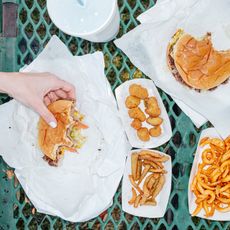 Avoid These 6 Foods—They'll Wreck Your Gut Health
Avoid These 6 Foods—They'll Wreck Your Gut HealthWhat to eat instead.
By Sarah Yang
